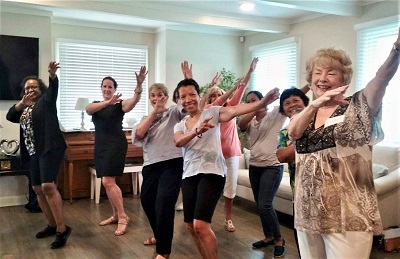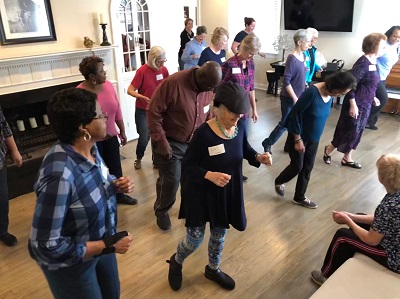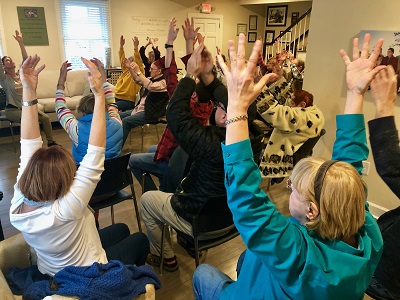Caregivers Need Care, Too!

Fortify Mind, Body & Spirit
The demands of caregiving can be overwhelming, especially if you feel you have little control over the situation or you’re in over your head. If the stress of caregiving is left unchecked, it can take a toll on your health, relationships, and state of mind—eventually leading to burnout. When you’re burned out, it’s tough to do anything, let alone look after someone else. That’s why maintaining a balance of the mind, body, and soul isn’t just a luxury — it is a necessity to live a happy and fulfilled life.
The three are interconnected and a weakness or imbalance in one of these aspects is crippling to the others. For example, the severe emotional stress of caregiving on the mind can cause high blood pressure and other illnesses in an otherwise healthy body. By the same token, a physical illness or injury can cause depression in a usually healthy mind.

The soul is the third part of balance for caregivers. The soul has a great effect on happiness and how people tend to view the world around them. Many people acquire a balanced soul through religious practices and participation in religious services. Spiritual happiness can also come from secular sources, like meditation. There are many parts to keeping a balanced mind, body, and soul. Fortunately, there are resources and tools to guide us in the quest for that balance. Check out our Self-Care Youtube Videos to get started!

Caregiver Health
Despite its challenges, caregiving can also be rewarding, and there are a lot of things you can do to make the caregiving process easier for both you and your loved one. Being a caregiver requires stamina and good health. The journey is more of a marathon than a sprint and you need to be in the best condition possible. Taking care of you is essential to your own well-being and is crucial for your loved one’s health and comfort. If you are in good physical and mental health, you will be able to handle the challenges that present each day and provide the best care possible. If you ignore your own health, you risk becoming ill. Maintaining your own health is an investment that will pay off for your whole family.
Eating Well
Nutrition affects physical and emotional health. Proper diet helps protect caregivers from medical based stress, while poor nutrition can lead to lower immunity and disease. Small changes in diet can have benefits for health and wellbeing. Planning menus and making shopping lists ahead of time helps make grocery shopping and preparation quicker. Look for tasty, easy to prepare meals like those in our newsletter. When you cook, make extra and freeze portions to use later. Try to stock up on healthy snacks and if you usually eat on the run, have fresh fruits, vegetables and proteins (like cheese wedges, roasted unsalted nuts or meat slices) ready in your kitchen to grab and go.

Physical Activity

-
Stepping outside to do a little gardening.
-
Taking a brisk walk around the block.
-
Exercising to a DVD or video at home when you have time.
-
Doing every day chores has a health benefit. Tip: Listening to music while doing chores can help.
Exercise
We can’t over-stress enough the importance of exercise to your health. While developing an exercise plan that fits your schedule, keep these points in mind:
-
Five minutes of activity several times a day adds up to a good plan for obtaining moderate exercise.
-
Moderate exercise improves blood flow, enhances energy and diminishes risk for disease and injury.
-
Try to walk a total of 20 minutes a day, three days a week to start, and build up to 30 minutes, five days a week.
Try low impact workouts like chair yoga, line dancing or tai chi!

You can find easy, low impact workouts on our YouTube Wellness Playlist anytime! From chair yoga and tai chi to an energizing drumming circle, we've got you covered! CLICK HERE to browse the Wellness Playlist to find what works for you.
Spiritual Care
We know through research that when a loved one is diagnosed many caregivers (and their loved ones) have challenges with their faith or their belief in a Higher Power or God when diagnosed. Sometimes, a religious care intervention through a Priest, Chaplain, Minister, Rabbi or other, that reflects your faith can be helpful because it is to be expected that health challenges and caregiving responsibilities can bring up fears and insecurities. That’s when spiritual care can be meaningful.

It doesn’t have to mean that we agree with or even support another’s religious practice. It doesn’t mean that our own biases or judgments will go away. It simply means that we while we admit and acknowledge those things exist, the differences are not consequential when giving spiritual care. All that is required to be spiritually present, is to listen deeply, and to create a safe place for others to open up and share feelings. It may mean allowing another to share emotions and feelings without being interrupted or lectured. Being present means resisting a well-meaning urge to offer advice or assurances that “everything happens for a reason”. Listening and offering a safe place of support for exploring feelings and building trust through that experience is the best way to offer support. When you do this, you are “compassionately bearing witness” to another’s pain and suffering but just being there for them. Often the person just needs a place to vent, so you don’t need to “fix” the problem. Think of it as offering service rather than offering help. Service is a relationship between equals that allows us to see the whole person, rather than see their disease or what is wrong.
So, establish eye contact, listen well and become a vessel for receiving whatever the person needs to offer. You don’t have to worry about how to solve it or what to do. Just being there is a loving action. That’s more than enough. In fact, that is everything.

